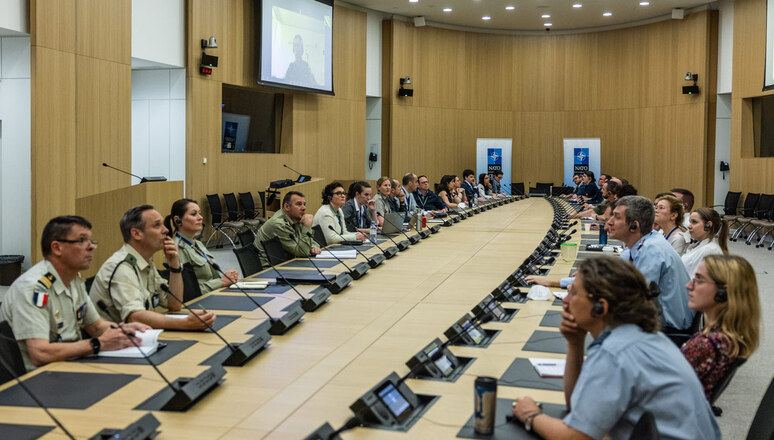On the 9th of May 2022, the NATO International Military Staff (IMS) hosted their third Deep Dive Session, this time looking at the importance of the gender perspective in Cooperative Security. This session mentioned how projecting stability and strengthening security through cooperation, dialogue and partnerships requires a gender dimension. There were presentations from the Civil-Military Cooperation (CIMIC) Centre of Excellence (CoE), EU Military Staff, SHAPE Partnership Directorate and from Columbia, NATO’s newest Partner.

Lieutenant Colonel Thomas Hoehl, CIMIC CoE started by explaining that the crosscutting topics of Gender and Women, Peace and Security (WPS) “is all of NATO’s business, not just its gender advisors”. He highlighted how NATO is able to learn a lot from its partners in regards to cooperative security. For example, the NATO Mission Iraq and partners from the international community participated in an Iraqi-led Workshop at the al Nahrain Centre for Strategic Studies. The aim was to strengthen understanding on the relevance of Protection of Civilians, Human Rights, Women, Peace and Security, Children and Armed Conflict, Cultural Property Protection in crisis management. He also emphasised how NATO-accredited entities, such as the Nordic Centre for Gender in Military Operations (NCGM), and non-NATO nations like Sweden play a key role in advancing the gender perspective. The NCGM delivers training to NATO personnel on Gender in Military Operations.
Ms. Terhi Lehtinen, from the EU Military Staff (EUMS), explained how effective multilateralism is one of the main objectives of the EU’s foreign policy. The EU has passed a new EU Gender Action Plan III for 2021-2025, which integrates gender equality as a core value for security. She stated that “integrating a gender perspective for security-related contexts is crucial for international partnerships.” The EU has a new Ambassador for Gender and Diversity, H.E. Stella Ronner Grubačić, who engages internationally to promote gender equality and diversity. Ms. Lehtinen concluded with the idea that “there is a new momentum to integrate a gender perspective in capacity building and as a means to improve operational effectiveness in military operations”. We look forward to reading the EU Baseline Study on Gender and Human Rights Mainstreaming in the EU Common Security and Defence Missions and Operations.
Finally, Lieutenant Colonel Ricardo Rodriguez and Ms. Paola Pasini from the Military Cooperation Division within the SHAPE Partnership Directorate (SHAPE – PD) explained what NATO is doing to further the gender perspective in cooperative security, inviting colleagues from Colombia to discuss the efforts their military is taking to “make sure their institution guarantees a team of experts to protect equity and respect”. SHAPE-PD noted that in the past year, there have been increasing requests and discussions for gender-related topics and trainings. Currently, SHAPE offers 15 courses for partner nations in regards to training on the gender perspective.
In summary, the gender perspective runs through NATO’s core work, including cooperative security. The Bi-SC Directive 40-1 is NATO’s key document on integrating the gender perspective and UNSCR1325. NATO Partners are involved in many of NATO’s core activities, from shaping policy to building defence capacity, developing interoperability and preventing/managing crises. Tackling current security issues will only be possible if a broad range of views are taken into account – from women, men, girls and boys. Crosscutting integration of the gender perspective is central for partnership frameworks not only in order to support NATO’s values, but also to be truly effective and aware of all implications as we work with external partners.
